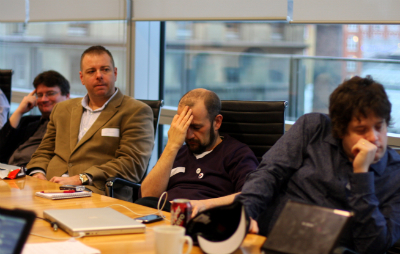Jan 22, 2010 10
Hardwired State
It’s easy to see why projects fail.
Why ‘open goals’ are so often missed trying to improve public services with new technologies.
Or is it?
What’s been happening in recent months?
Rewired State: generated 30+ ideas in one day for better use of public information to transform public services, many backed up by working prototypes.
Young Rewired State: yet more ideas, and real code, from 15-18 year olds.
Barcamps, Reboot Britain, Show Us A Better Way and many other initiatives: creativity, inspiration, passion, and even solutions.
The daily activities of hundreds of developers, policy enthusiasts, data specialists, lobbyists and real service users to make things better.
And through things like the proposal for a Rewired State-type event within government, we’ll no doubt see that the public sector already has many committed people with the skills to do amazing things with technology, processes and information.
Ideas and talent aren’t the issue, evidently.
Yet how many of these ideas are actually crossing the seemingly vast divide to become ‘production’ public services?
We have a few ideas about why this might be the case: not enough will to change; would it scale?; procurement never works like that in practice; sure, you can design smart new services but can you sustain them?… And so on…
And perhaps we’re right. We’re probably on the right track with some of these. But we don’t really know. And until we do know, we’re poorly armed to take on the systemic issues that really stand in the way of public service innovation. Only by having a well-structured agenda can the things that really need to change, be changed.
What we experience might be the consequences of perfectly rational decisions. Rational decisions that at a detailed level make perfect sense. But when combined into complex systems, such as those that procure and operate public services, can have very irrational consequences. It might be. But we don’t really know.
So how do we get to know?
Here’s a proposal.
Hardwired State?*
What it is
A small number of great ideas are taken on by a panel. Over a few weeks the panel meet regularly, virtually if necessary, and agree a series of steps which would, in theory, bring these ideas to life as real public services.
A small team follow this direction, and simulate the progress of this idea as it becomes a service. Any actual actions or financial commitments are simulations, but the decisions, and decision-makers involved, along the way are all real.
All progress is documented. As, perhaps more interestingly, are any blockages.
That’s it.
Who’s on the panel?
A minister, a senior civil servant, a journalist, an executive from a public services supplier, a developer, a community worker and an independent information management professional.
Facilitated very carefully, and with some clear rules.
Rules
Money is no barrier to progress. This is a simulation exercise. But it all gets counted along the way.
(Realistically, there will be some real costs involved even as a simulation. Questions of suppliers in particular will sometimes need funding to get an answer. This funding needs to be available, and recorded.)
Decisions are real: if something is agreed to, it’s agreed to as it if were actually going to be implemented, at a level of authority which would be required to do so, for real.
Behaviours: this is a potentially hard-hitting exercise. But it is intended to show systemic issues, not to show up individuals. Respect for the skills, talents and experience of all involved in designing and delivering public services will be upheld throughout.
This is “fantasy project management”, if you will. A one-off exercise to really demonstrate the art of the possible. And to inform an agenda for change that will unlock so much of the potential shown in the initiatives already mentioned.
What could possibly go wrong?
Of course, early 2010 probably isn’t the time to do something like this. Other priorities may occupy the attention of the movers and shakers who’d have to get behind this.
But it’s an illustration of one way in which we could get away from generating innovative ideas that don’t actually go anywhere. And take a whole-life look at the real implementation issues that have to be tackled to make a difference in the real world.
-
What do you think? Should we try it?
*The question mark is intentional, and fair. The outcomes of this exercise are not prejudged. The title is inspired by the paradox of unchangeable URLs (that serves as an excellent metaphor for making technology change happen in government). It’s almost as if the state has hardwired itself.

